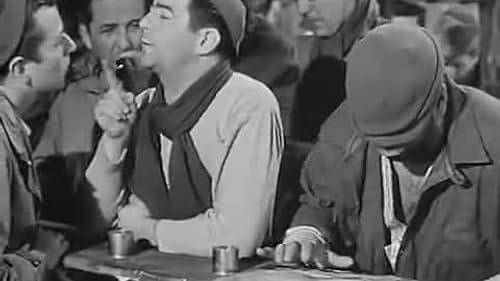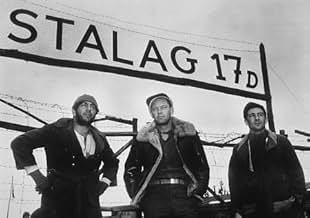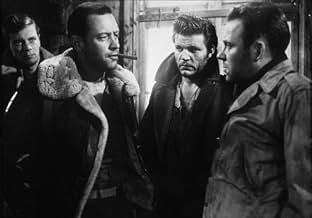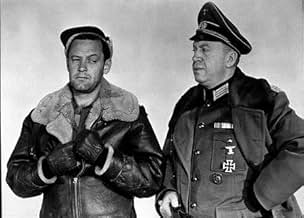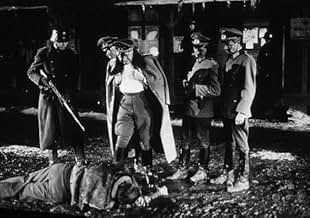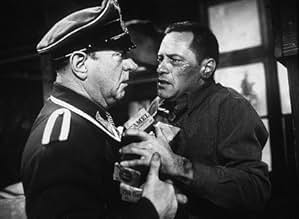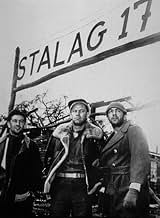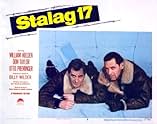After two Americans are killed while escaping from a German P.O.W. camp in World War II, the barracks black marketeer, J.J. Sefton, is suspected of being an informer.After two Americans are killed while escaping from a German P.O.W. camp in World War II, the barracks black marketeer, J.J. Sefton, is suspected of being an informer.After two Americans are killed while escaping from a German P.O.W. camp in World War II, the barracks black marketeer, J.J. Sefton, is suspected of being an informer.
- Won 1 Oscar
- 2 wins & 8 nominations total
Gil Stratton
- Sgt. Clarence Harvey 'Cookie' Cook
- (as Gil Stratton Jr.)
Featured reviews
There was surprisingly enough a lot of humor in the American attitude toward the Nazis and the Germans during World War II. Life goes on even under the conditions of being prisoners of war, and people need to laugh. In such circumstances, they especially need to laugh. We can see that in some of the songs from that time and in this play from Donald Bevant and Edmund Trzcinski that Billy Wilder made into an unusually good movie. It should be realized that the full extent of the horror that the Nazis had visited upon Europe was not known until after the war was over and we saw the films of the concentration camps.
William Holden stars as Sgt J.J. Sefton whose amoral cynicism and gift for the cheap hustle allow him to feather his nest even while a prisoner of war.
He's the guy who always had a storehouse of cigarettes, booze, silk stockings, candy, etc. under his bunk, the guy who always won at cards, whose proposition bets always gave him the edge. We had a guy like that when I was in the army. We called him "Slick."
But William Holden's Sefton is more than Slick. He is outrageously cynical and uncommonly brave. He takes chances because he doesn't have the same kind of fear that others have. Most people would feel self-conscious (and nervous) eating a fried egg while everybody else in the barracks had watery-thin potato soup. Others might feel uncomfortable with bribing German guards for bottles of Riesling or tins of sardines. Not Sefton. He flaunts his store of goodies.
Perhaps that is overdone. Perhaps the real hardships that prisoners went through are glossed over in this comedic drama--a comedy, incidentally, that plays very much like a Broadway musical without the music. Perhaps it is the case that from the distance of 1953 the deprivations of Stalag 17 have faded from memory and it is the "good times" that are recalled.
At any rate, I think it is this kind of psychology that accounts for the success of this unusual blend of quasi-realism and burlesque. Certainly Stalag 17 has been widely imitated, most familiarly in the TV sit-com "Hogan's Heroes" and to some extent on Rowan and Martin's "Laugh-In." Roberto Benigni's Life Is Beautiful, on the other hand, which also finds humor in the horrific, is of a different genre. Like Ionesco's Rhinoceros, Benigni's movie is from the theater of the absurd, not the Broadway stage.
Holden won an Oscar for his performance and Robert Strauss who played Animal was nominated in a supporting role. Otto Preminger, the legendary director and producer, was excellent as the two-faced Col Von Scherbach, the ex-calvary commander and camp commandant who can only take a phone call from the high command with his boots on so he can click his heels. I also liked Sig Rumann as Sgt Johann Sebastian Schulz ("always making with the jokes, you Americans") whose previous career as a wrestler in the US accounts for his English-language skills. Gil Stratton, who for years did the sports for CBS Channel 2 in Los Angeles, is interesting as Sefton's sidekick and funky.
Indeed, what is responsible for the success of this movie as much as anything is this fine cast playing well-defined character roles. By the way, Strauss and Harvey Lembeck ("Sugar Lips" Shapiro) were reprising their roles from Broadway.
Important is the fine plot line in which Sefton is accused of being a spy for the Nazis while the real spy is exposed step by step. At first we don't know who it is, and then we do, and then the prisoners find out.
This should be compared with Sunset Boulevard (1950). While very different movies they have similar elements which reveal part of the psyche and methods of director Billy Wilder. First there is the anti-hero as the protagonist, in both cases played by William Holden. Then there is a lot of the old Hollywood crowd appearing in both films including directors appearing as actors, Erich von Stroheim (not to mention Cecil B. DeMille in his memorable cameo as himself) in Sunset Boulevard, and Otto Preminger here. Sig Rumann has over a 100 credits going back to at least the early thirties. Finally there is the discordant mix of comedic and dramatic elements, a mix that works on our psyches because life is to some very real extent filled with tragedy in close congruence with the laughable.
But see this for William Holden who was the kind of actor who was best playing a compromised character as here and as the failed writer/reluctant gigolo in Sunset Boulevard, an actor who drank too much and tended to undistinguished, but when carefully directed could rise above his intentions and give a sterling performance.
(Note: Over 500 of my movie reviews are now available in my book "Cut to the Chaise Lounge or I Can't Believe I Swallowed the Remote!" Get it at Amazon!)
William Holden stars as Sgt J.J. Sefton whose amoral cynicism and gift for the cheap hustle allow him to feather his nest even while a prisoner of war.
He's the guy who always had a storehouse of cigarettes, booze, silk stockings, candy, etc. under his bunk, the guy who always won at cards, whose proposition bets always gave him the edge. We had a guy like that when I was in the army. We called him "Slick."
But William Holden's Sefton is more than Slick. He is outrageously cynical and uncommonly brave. He takes chances because he doesn't have the same kind of fear that others have. Most people would feel self-conscious (and nervous) eating a fried egg while everybody else in the barracks had watery-thin potato soup. Others might feel uncomfortable with bribing German guards for bottles of Riesling or tins of sardines. Not Sefton. He flaunts his store of goodies.
Perhaps that is overdone. Perhaps the real hardships that prisoners went through are glossed over in this comedic drama--a comedy, incidentally, that plays very much like a Broadway musical without the music. Perhaps it is the case that from the distance of 1953 the deprivations of Stalag 17 have faded from memory and it is the "good times" that are recalled.
At any rate, I think it is this kind of psychology that accounts for the success of this unusual blend of quasi-realism and burlesque. Certainly Stalag 17 has been widely imitated, most familiarly in the TV sit-com "Hogan's Heroes" and to some extent on Rowan and Martin's "Laugh-In." Roberto Benigni's Life Is Beautiful, on the other hand, which also finds humor in the horrific, is of a different genre. Like Ionesco's Rhinoceros, Benigni's movie is from the theater of the absurd, not the Broadway stage.
Holden won an Oscar for his performance and Robert Strauss who played Animal was nominated in a supporting role. Otto Preminger, the legendary director and producer, was excellent as the two-faced Col Von Scherbach, the ex-calvary commander and camp commandant who can only take a phone call from the high command with his boots on so he can click his heels. I also liked Sig Rumann as Sgt Johann Sebastian Schulz ("always making with the jokes, you Americans") whose previous career as a wrestler in the US accounts for his English-language skills. Gil Stratton, who for years did the sports for CBS Channel 2 in Los Angeles, is interesting as Sefton's sidekick and funky.
Indeed, what is responsible for the success of this movie as much as anything is this fine cast playing well-defined character roles. By the way, Strauss and Harvey Lembeck ("Sugar Lips" Shapiro) were reprising their roles from Broadway.
Important is the fine plot line in which Sefton is accused of being a spy for the Nazis while the real spy is exposed step by step. At first we don't know who it is, and then we do, and then the prisoners find out.
This should be compared with Sunset Boulevard (1950). While very different movies they have similar elements which reveal part of the psyche and methods of director Billy Wilder. First there is the anti-hero as the protagonist, in both cases played by William Holden. Then there is a lot of the old Hollywood crowd appearing in both films including directors appearing as actors, Erich von Stroheim (not to mention Cecil B. DeMille in his memorable cameo as himself) in Sunset Boulevard, and Otto Preminger here. Sig Rumann has over a 100 credits going back to at least the early thirties. Finally there is the discordant mix of comedic and dramatic elements, a mix that works on our psyches because life is to some very real extent filled with tragedy in close congruence with the laughable.
But see this for William Holden who was the kind of actor who was best playing a compromised character as here and as the failed writer/reluctant gigolo in Sunset Boulevard, an actor who drank too much and tended to undistinguished, but when carefully directed could rise above his intentions and give a sterling performance.
(Note: Over 500 of my movie reviews are now available in my book "Cut to the Chaise Lounge or I Can't Believe I Swallowed the Remote!" Get it at Amazon!)
Although the film has several comedy scenes, I believe that the focus of the film is not that, the story is very believable, it deals with espionage, anger, doubt, revolt, envy among other feelings. Approaching such a serious topic, comedy comes to alleviate the tensions experienced by the characters. A great movie, I think it ended up revealing its secret too soon.
A classic without a shadow of a doubt, showing in a relaxed way life in a camp of pioneers approaching aspects that may have happened in a certain way. Actors fluent in English and German is a great differential for the film as it further enriches the narrative.
A classic without a shadow of a doubt, showing in a relaxed way life in a camp of pioneers approaching aspects that may have happened in a certain way. Actors fluent in English and German is a great differential for the film as it further enriches the narrative.
In his lengthy and eventful career, Billy Wilder created many films that have rightly attained classic status, but his WWII prisoner of war comedy-drama Stalag 17 is arguably one of his best. The scripting is a perfect example of how to marry a tight plot with sharp dialogue and great characters, and the acting is flawless on all counts. While William Holden's performance as the cynical American sergeant rightly won him an Oscar, it is the comic antics of Robert Strauss and Harvey Lembeck that steal the show. And if there was ever a more entertaining ensemble of previously unseen (and sadly subsequently unheard of) supporting players - with the possible exception of Casablanca - I would love to see it. This film predates the more famous WWII pow film The Great Escape by more than a decade, but had Wilder, Holden and company not caused havoc in Stalag 17, the world would never have seen Steve McQueen play the cooler king with such wry aplomb. Stalag 17 is easily one of the finest films of its time, if not of all time, and I would encourage anyone who has never experienced its unique blend of cynicism, comedy, suspense and drama to check it out at the earliest available opportunity.
This absorbing and very entertaining movie creates a believable and interesting cast of characters, puts them into an intriguing story, and uses its settings, props, and other resources very creatively. It is a fine combination of drama and comic relief that stands up very well against anything else of its type. The setting and atmosphere are quite believable, and they make it easy to enter the characters' world.
The opening sequence sets up everything nicely, with most of POW's helping two of the prisoners in an escape attempt, while William Holden as the cynical Sefton separates himself from the rest. Sefton is interesting enough as it is, a man who simply by remaining true to his nature cannot help arousing suspicion and antagonism, and Holden was quite a good choice to play him. The story builds up nicely, with developments coming at a careful pace, and some good stretches of lighter material.
There are numerous interesting characters and good performances among the other prisoners, and in particular Robert Strauss and Harvey Lembeck steal more than one scene with their antics which, though goofy, are also an appropriate complement to the main plot and the setting. The German characters are more stylized, but both Sig Ruman and Otto Preminger make them come to life, and help them fit in seamlessly with the others.
Billy Wilder's direction and the photography also deserve praise. Besides the way that each sequence fits together so nicely with the others, there are several individual scenes and shots that are done in an impressive fashion - not flashy, but creative and thoughtful. The scene with Holden lying on his cot while most of the others sing and celebrate is one particularly good example. There is a wealth of good material throughout, making "Stalag 17" a classic that has lost nothing over the years, and one that can be seen and enjoyed several times.
The opening sequence sets up everything nicely, with most of POW's helping two of the prisoners in an escape attempt, while William Holden as the cynical Sefton separates himself from the rest. Sefton is interesting enough as it is, a man who simply by remaining true to his nature cannot help arousing suspicion and antagonism, and Holden was quite a good choice to play him. The story builds up nicely, with developments coming at a careful pace, and some good stretches of lighter material.
There are numerous interesting characters and good performances among the other prisoners, and in particular Robert Strauss and Harvey Lembeck steal more than one scene with their antics which, though goofy, are also an appropriate complement to the main plot and the setting. The German characters are more stylized, but both Sig Ruman and Otto Preminger make them come to life, and help them fit in seamlessly with the others.
Billy Wilder's direction and the photography also deserve praise. Besides the way that each sequence fits together so nicely with the others, there are several individual scenes and shots that are done in an impressive fashion - not flashy, but creative and thoughtful. The scene with Holden lying on his cot while most of the others sing and celebrate is one particularly good example. There is a wealth of good material throughout, making "Stalag 17" a classic that has lost nothing over the years, and one that can be seen and enjoyed several times.
Despite the fact that this movie got made 10 years before the WW II POW classic "The Great Escape", the movie is still known as the 'other' WW II POW movie. While I do admit that "The Great Escpae" is still a better movie than this one ("The Great Escape" is probably one of my favorite all time movies) this movie is a great and classic one as well.
Just like "The Great Escape", the movie knows to create a perfect balance between its drama and comedy. This movie could easily been turned into a heavy war drama but instead a more light approach gets picked, without loosing any of its serious and more dramatic power. It makes the movie entertaining as well as effectively powerful. It can be assumed that "The Great Escape" and its style got inspired by this movie.
The movie is a 'great' portrayal of the lives of American officer POW's, in a German stalag. They try to make the best of it, with very limited resources. Every small thing and things that are out of the ordinary are the things that make them go through their days and is what's keeping them alive. The first halve of the movie isn't even about the William Holden character and he is just one of the boys. It isn't after about halve way through the movie that the story takes to take shape and the main plot of the movie becomes obvious. In advance you would just expect from this movie to be one about POW's trying to escape. But the story is way better written and layered than that though.
But it above all things is also a very well made and especially directed one, by 6 time Academy Award winner Billy Wilder. He also received a directing nomination for this movie. It's a '50's movie but it doesn't feel like one. The movie seems to be ahead of its time with its story handling, directing and just overall style of film-making. The camera-work is especially great and worth mentioning.
William Holden does a great job at portraying a complicated character. At first you just don't know what to think of him and he isn't a very likable character but he slowly turns into a strong and more important character, that starts doing the right thing. Holden also actually won an Oscar for his role in this movie, despite the fact that he never really wanted to do this movie. It was the only Oscar he ever got, which makes it quite ironic.
A great powerful, entertaining classic, which was truly ahead of its time.
10/10
http://bobafett1138.blogspot.com/
Just like "The Great Escape", the movie knows to create a perfect balance between its drama and comedy. This movie could easily been turned into a heavy war drama but instead a more light approach gets picked, without loosing any of its serious and more dramatic power. It makes the movie entertaining as well as effectively powerful. It can be assumed that "The Great Escape" and its style got inspired by this movie.
The movie is a 'great' portrayal of the lives of American officer POW's, in a German stalag. They try to make the best of it, with very limited resources. Every small thing and things that are out of the ordinary are the things that make them go through their days and is what's keeping them alive. The first halve of the movie isn't even about the William Holden character and he is just one of the boys. It isn't after about halve way through the movie that the story takes to take shape and the main plot of the movie becomes obvious. In advance you would just expect from this movie to be one about POW's trying to escape. But the story is way better written and layered than that though.
But it above all things is also a very well made and especially directed one, by 6 time Academy Award winner Billy Wilder. He also received a directing nomination for this movie. It's a '50's movie but it doesn't feel like one. The movie seems to be ahead of its time with its story handling, directing and just overall style of film-making. The camera-work is especially great and worth mentioning.
William Holden does a great job at portraying a complicated character. At first you just don't know what to think of him and he isn't a very likable character but he slowly turns into a strong and more important character, that starts doing the right thing. Holden also actually won an Oscar for his role in this movie, despite the fact that he never really wanted to do this movie. It was the only Oscar he ever got, which makes it quite ironic.
A great powerful, entertaining classic, which was truly ahead of its time.
10/10
http://bobafett1138.blogspot.com/
Did you know
- TriviaWilliam Holden never felt he deserved an Oscar for his performance in this film. His wife felt it was to compensate for him not winning for "Sunset Boulevard (1950)."
- GoofsIt's December 1944. Every morning at 6:00 it's roll call for the prisoners of Stalag 17. Although in the middle of December, in southern Germany the sun will never rise before 8:00; the roll call in the movie is in full daylight.
- ConnectionsFeatured in Paramount Presents (1974)
- SoundtracksWhen Johnny Comes Marching Home
(1863) (uncredited)
Written by Louis Lambert
Played during the opening credits
Played on a record and sung by the prisoners of war
Whistled a bit by Gil Stratton at the end
Details
- Release date
- Country of origin
- Languages
- Also known as
- Infierno en la tierra
- Filming locations
- Production company
- See more company credits at IMDbPro
Box office
- Budget
- $1,661,530 (estimated)
- Runtime2 hours
- Color
- Aspect ratio
- 1.37 : 1
Contribute to this page
Suggest an edit or add missing content


